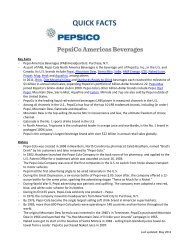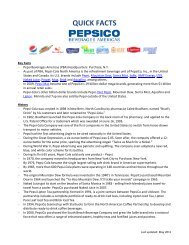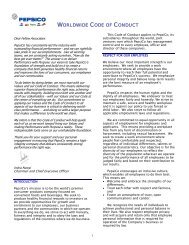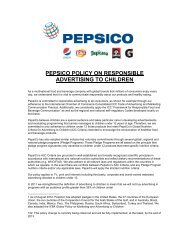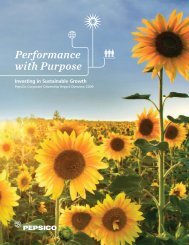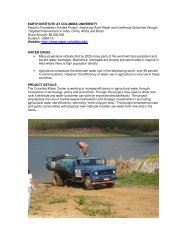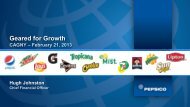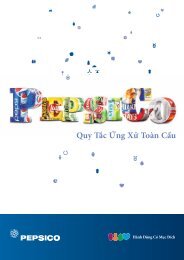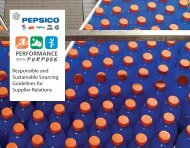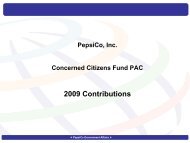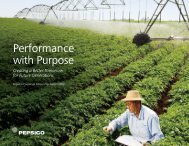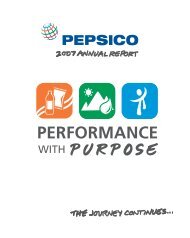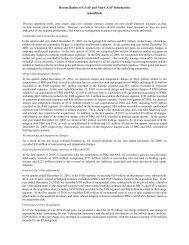Download our 2008 Sustainability Report Overview - PepsiCo
Download our 2008 Sustainability Report Overview - PepsiCo
Download our 2008 Sustainability Report Overview - PepsiCo
You also want an ePaper? Increase the reach of your titles
YUMPU automatically turns print PDFs into web optimized ePapers that Google loves.
Climate ChangeUnderstanding Our Brands’ Carbon FootprintClimate change may adversely affect the raw materialsand other supplies we use to make <strong>our</strong> products, includingwater and various crops from potato, oats and corn tooranges and apples.Throughout <strong>our</strong> business, an important part of <strong>our</strong>greenhouse gas (GHG) emissions results from the energyused in <strong>our</strong> manufacturing and related processes. We arereducing <strong>our</strong> emissions through more efficient use of nonrenewablefuels and increased use of renewable energy.We also partner with nongovernmental organizations toexamine how <strong>our</strong> business impacts climate change andhow we can change the way we work to further reduce<strong>our</strong> footprint.GHG EMISSIONS*in million metric tons20062007<strong>2008</strong>Total <strong>PepsiCo</strong> Beverages3.56 0.723.713.760.770.84GHG EFFICIENCY IMPROVEMENT*in %Beverages2007<strong>2008</strong> 3.00as compared to 2006 base year5.50FoodsFoods2.842.932.922.10* The <strong>2008</strong> GHG data presented in the charts above has gone throughthird-party verifi cation and represents nearly 85% of total Scope 1emissions for <strong>PepsiCo</strong>. This data is comparable to the 2006 and 2007data reported for trending. Scope 1 emissions include the following forcompany-owned operations:• Fuel combusted during manufacturing, calculated by standardemissions factors according to each fuel• Fuel combusted for building heat• Emissions from fl eet vehicles, based on vehicle type, fuel typeand volume of fuel used• Fugitive emissions from refrigeration units at manufacturingsites based on leak rates and refrigerant purchases4.50In 2003, we began working with the Carbon Trust, anindependent, not-for-profit company set up by the U.K.government to help businesses address the growing threatof global climate change and to pioneer carbon footprintingmethodology and standards. The Carbon Trustbelieves that in order to effectively reduce a company’scarbon footprint, they must first know how to accuratelymeasure it.Since 2000, Walkershas reduced itsenergy use per packby one-third andreduced water use by42%We began the work with <strong>our</strong> leading crisp brand inthe U.K., Walkers Crisps. Following months of intenseresearch, Walkers became the first consumer brand topilot the original method for assessing product carbonfootprints and the first major food brand to display acarbon footprint/reduction label on its packs. Since 2000,Walkers has reduced its energy use per pack by one-thirdand its water use by 42%, and it is committed to reducingthe carbon footprint of its products even further.The collaborative work continued and most recently,Tropicana Pure Premium Orange Juice became the firstconsumer brand in North America to be independentlycertified by the Carbon Trust. The process included workingwith an academic research partner, the Earth Institute atColumbia University, to determine the mapping process.The Carbon Trust then conducted a review of scientificlife cycle data and certified the carbon footprint of astandard 64-ounce carton by:• Mapping the product life cycle — from growing andsqueezing oranges and getting the container on theshelves, to finally disposing or recycling the packaging.• Looking at the energy consumption directly involved ineach of these life cycle stages and converting this intoequivalent carbon dioxide emissions (CO₂e).• Adding the equivalent carbon dioxide emissions (CO₂e)from each stage to estimate the total product greenhousegas footprint of the product.Using this process, the estimated carbon footprint for a64-ounce carton was determined to be 1.7 kilograms.The Carbon Trust has certified the footprint, giving<strong>PepsiCo</strong> a verifiable benchmark against which the companycan measure GHG reduction progress going forward.In coming years, additional products, including Pepsi,Diet Pepsi, Aquafina and Gatorade, will be assessed.Today, more than 10 products that represent a truemarket basket of <strong>our</strong> consumer offerings are currentlybeing evaluated for a carbon footprint.This science-based information is helping <strong>our</strong> businessestarget operational improvements and achieve theirenergy efficiency goals, while striving for even moreambitious, yet realistic, targets.Uncovering information about where and why carbonis generated in the manufacturing, distribution anddisposal of products will also help drive collaborationwith partners and suppliers on carbon reduction initiativesand elevate consumer awareness.<strong>PepsiCo</strong> Corporate Citizenship <strong>Report</strong> <strong>2008</strong> 13



